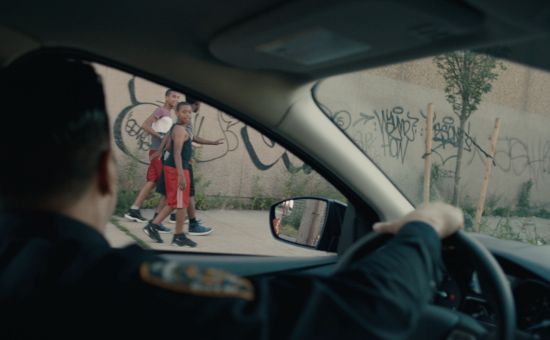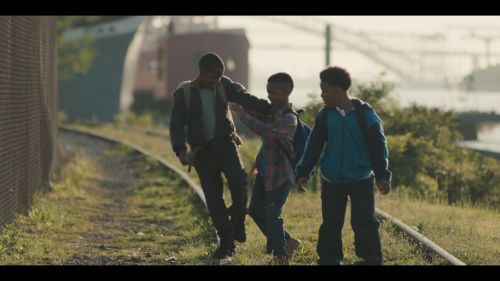
Seyi Peter-Thomas on Acclaimed Branded Short 'How Do You Raise a Black Child?'

Station Film’s Seyi Peter-Thomas is an Emmy Award-winning director whose most recent work includes MasterCard’s touching #ArnieWould commercial in honor of the late great golfing legend, Arnold Palmer. The spot features scenes in which one character—ranging from children playing golf to professionals on tour—gives another advice, each ending with the heartfelt comment, “Arnie Would". Seyi created and directed this year’s Webby-nominated branded short for Motionpoems, How Do You Raise A Black Child (also a One Show and AICP finalist with winners still to be announced). It’s a pensive, powerful and beautifully shot film based on the poem by Cortney Lamar Charleston observing a mother and son in their daily rhythms under circumstances specific to young black boys becoming men in America. Seyi has also helmed campaigns for MTV, commercials for Truth (Anti-Tobacco), Sprint, Geico and many other brands.
We sat down with Seyi to learn about what inspires him, his early roots at MTV, how he came to be a filmmaker nimble across comedy and drama, and other fun facts.
Q> Comedy or Drama? You do both so well, from your very funny VMA Geico tie-in spots and star-studded MTV VMA West Side Story promo to the emotional “Arnie Would” spot you directed for MasterCard and the branded short, How Do You Raise A Black Child. Do you prefer one genre over the other?
SPT> What’s funny is that I started prepping the Geico campaign the day after we finished shooting How Do You Raise a Black Child. So, yes, I transition quite comfortably between the two worlds.
Both in comedy and in more emotive work, I’m really compelled by creating moments on screen where relatable, nuanced characters can butt up against extreme or even laughably ridiculous situations. I think of each spot as its own tiny movie, so I’m always pushing to make the story feel as richly layered as possible and to use the camerawork to underscore or punctuate the central emotion or punch line for the viewer. Those approaches hold true for all my work, regardless of genre.
Seyi Peter-Thomas "How Do You Raise A Black Child?" from Station Film on Vimeo.
Q> Motionpoems. Talk about the process of adapting an acclaimed poem to a film. Were there things integral to the poem you felt you had to keep?
SPT> Well, obviously both the poem and the film deal with themes that are close to my heart. Most important for me was to retain the sense of ambiguity that the poem has. The text provides a series of answers to the question of how to raise a black child. But, the answers never solve the problem. There’s always a sense of desperately grasping at straws. With the film, I wanted the imagery to play against the text in a way that added meaning but also left room for interpretation and doubt. That lack of resolution was the most honest way for me to depict how most of us are feeling at the moment—about a growing list of issues.
Q> MTV On Air Promotions. Many inspirational talents such as yourself got started there. What about that environment was empowering, and how does it factor into your DNA as a filmmaker?
SPT> I was lucky to be at MTV during a special time. There was still this sense that the inmates were running the asylum. They basically hired a bunch of young creative people and gave us the tools and the freedom we needed to make cool stuff. Like art school, it was competitive but also very collegial, and we all kind of helped to push each other’s work forward.
That collaborative spirit is definitely something I took with me, and it’s something that the agencies and clients I work with now enjoy. I also learned how to really push each production to make sure every dollar ends up on screen. Because MTV budgets were fairly low, I made it my mission to develop a visual style for each spot that would transcend the limitations of the budget. Turns out that skill is even more relevant in advertising now than it was back then.
Maybe something to do with that makes the combination of toilet humour and momentous, cinematic filmmaking very appealing to me. It’s a Cecil B. DeMille dick joke. The world needs at least one of those, right?
Q> Writer/Director. Which of your favourite work have you both written and directed? And are you writing any projects now we can mention?
SPT> All of the MTV work is stuff that I wrote, directed and saw through completion. That’s something you don’t get to do much as a commercial director, but the experience was invaluable because I’m able to brainstorm with creatives and bring a lot of ideas to the table. And, I’m always shooting with the editor in mind.
I think my favourite is The Hard Times of RJ Berger piece. I was born in London and didn’t move to the States until I was 12. So, my sensibilities are very much informed by that merging of cultures. Maybe something to do with that makes the combination of toilet humour and momentous, cinematic filmmaking very appealing to me. It’s a Cecil B. DeMille dick joke. The world needs at least one of those, right?
Yes, I still write as well. I’m developing a feature script that takes some of the themes of How Do You Raise A Black Child and puts them in a very different context, kind of an alternate present. There’s also a comedy short I want to make this year with an improv performer friend of mine, based on a character she’s created.

Q> Advertising Today. How does it compare today with when you began directing spots? So many platforms and formats. Is it liberating or daunting?
SPT> It’s exciting. I’m in kind of a generational sweet spot in that I learned the craft of filmmaking in a very linear, analogue environment. By the time I was directing professionally, the switch to digital was already happening and social media was taking off. So, all of these new platforms have been an easy pivot for me.
I think we’re in a place where the business is still kind of chasing eyeballs. People are trying to figure out how to adapt their 30-second spots to multiple platforms. My bet is that we are approaching a more liberated age where, as creatives, we’ll be able to choose the platform that best fits the idea and vice versa. One concept might be better realized as a serialized Snapchat story, another might be better as a 360 experience, etc. Since there is no captive audience anymore, the onus is on us as storytellers to create advertising that fits each medium and is worthy of people’s time and attention. To me, that’s the most exciting challenge.
Q> Inspiration. What inspires you in your work? In life?
SPT> All of the usual filmmakers you’d expect, but especially the Coen Brothers. As a director, I really admire the way they use camera, language and performance to set a specific and unique tone with each film.
Also, a lot of photography. The ability to freeze a fraction of a second in a way that can tell you so much without a single word, that’s part of why I got into this game. I always binge on images before I start a project.
In life, my kids provide me with every hilarity every day. My daughter is approaching five, and she’s just gotten to a stage where she can look around and make very astute yet merciless observations about the world. The other day she told me, with a weary shake of the head, that my new name is Forgetsy. Zero respect.
Q> Advice. What advice would you give kids who want to be directors?
SPT> I went to film school but I think you can skip that. Study photography, literature and acting, either in school or out of school, then go make some movies. Also, don’t listen to me.













